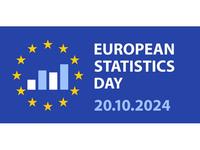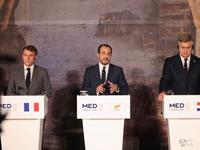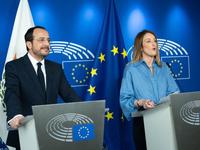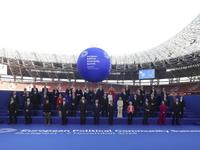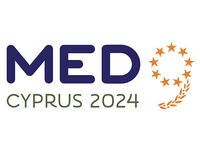Press Releases
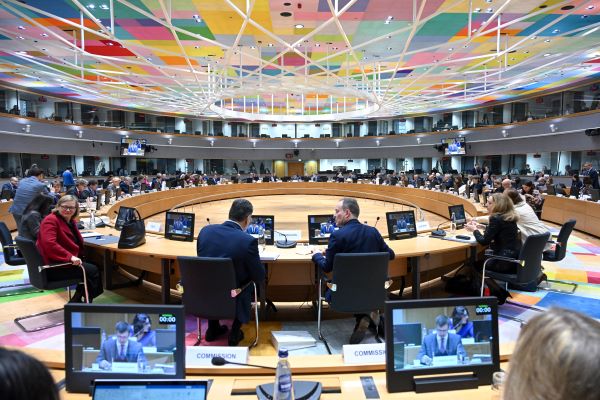
17-12-2024 20:33
Press release by the Secretariat of the Cyprus Presidency of the Council of the EU 2026 on the endorsement by the General Affairs Council of the Trio programme of Poland, Denmark and Cyprus
The General Affairs Council of the EU, held today in Brussels, endorsed the 18-month common programme of the Trio of Presidencies of Poland, Denmark, and Cyprus, which will begin on 1st January 2025, with the Polish Presidency.
The common programme of the Trio Presidency is organised around the following themes:
- A strong and secure Europe
- A prosperous and competitive Europe
- A free and democratic Europe
The Trio will focus, inter alia, on strengthening the EU's role as a global actor, enhancing the EU’s social approach in areas such as health and employment, and delivering on key priorities, including security, migration, enlargement, and competitiveness.
Cyprus will hold the Presidency of the Council of the EU in the first half of 2026.
The common programme is available here:
The programme
I. INTRODUCTION
Building on the strategic agenda 2024-2029, the trio of Presidencies - Poland, Denmark and Cyprus - commits to steering the work of the Council at the start of this new institutional cycle in the face of unprecedented challenges and geopolitical pressure on the European Union, in particular Russia’s war of aggression against Ukraine and the dramatic situation in the Middle East, which impact EU policies across the board.
The trio will launch work on the Multiannual Financial Framework post-2027, which will have to reflect the priorities in the strategic agenda 2024-2029.
The trio will maintain efforts to enhance dialogue with civil society and citizens, in particular youth, together with the EU institutions within their competences.
II. A STRONG AND SECURE EUROPE
Coherent and influential external action
Against the background of global tensions, the trio firmly believes that the Union must adapt to the new multipolar geopolitical context and assert its role as a global actor, while defending a rules- based multilateral system based on the UN Charter, actively promoting full respect for international law, including respect for sovereignty, territorial integrity and human rights for all.
The trio will prioritise EU engagement with partners at the global level, promoting international cooperation to address shared challenges and developing mutually beneficial strategic partnerships, including through the implementation of the Global Gateway, and thereby ensuring the Union’s open strategic autonomy, economic security and, resilience, and technological leadership, following the Team Europe approach.
The trio will aim to ensure continued and unwavering political, economic, military, energy, financial and humanitarian support for Ukraine, facing unprovoked and unjustified Russian aggression, for as long as it takes and within the broader objectives of promoting peace, security, stability, good governance and prosperity in the eastern neighbourhood. The trio is also committed to the EU and its Member States providing further humanitarian assistance and coordinating long- term financial support aimed at strengthening the defence capabilities, resilience and reconstruction of Ukraine. We will also work on sanctions and to strengthen and intensify the fight against their circumvention.
In light of the ongoing conflict in Gaza and the escalation in the broader region, which will have an impact on the region’s stability and security for the coming years, with repercussions on the EU itself, the trio will promote a credible and coherent European response, focusing on further humanitarian assistance, promoting sustainable peace and supporting reforms and reconstruction efforts, together with partners.
The EU will develop tailored cooperation with partners in the eastern neighbourhood, notably with Eastern Partnership countries. The scope of this cooperation will depend on each country’s willingness and ability. Such an approach should make it possible to use the full potential of cooperation with the most willing and able partners, such as Ukraine and Moldova, including in the context of EU enlargement.
Regarding the EU’s southern neighbourhood, the trio will reinvigorate the EU’s commitment to relaunch and further develop this strategic partnership. A strengthened Mediterranean partnership remains a strategic imperative for the EU, as the joint challenges require a common response.
The trio will prioritise cooperation with transatlantic partners, underscoring the importance of a continuous, mutually beneficial, and resilient strategic partnership with the United States, built on our strong transatlantic agenda and based on our shared democratic values and common interests, in full respect of the principles set out in the Treaties and by the European Council. The EU’s immediate neighbourhood and relations with regional organisations, such as the Gulf Cooperation Council (GCC), the European Free Trade Association (EFTA), the African Union, the Community of Latin American and Caribbean States (CELAC), and the Association of Southeast Asian Nations (ASEAN), are important priorities for the trio. The trio partners also look forward to exploring deepening relations with the UK, building on existing agreements, as well as stepping up engagement in the Indo-Pacific.
The trio will pursue an ambitious, open, robust and sustainable trade policy, through both bilateral agreements and restoring the rules-based multilateral trading system, including the WTO. In this regard, the trio will focus on reducing the Union’s vulnerability to strategic external dependencies and on diversifying and securing strategic supply chains. In that context, maritime security, including in the Red, Black and Baltic seas, will also be addressed.
Strategic action on security and defence
The trio will mobilise all instruments to contribute to ensuring the security of citizens, including preventing and fighting crime online and offline, further strengthening efforts to detect and combat terrorism, violent extremism and serious and organised crime and corruption using all relevant law enforcement and judicial cooperation tools.
The trio will also work to enhance preparedness and resilience to respond to natural disasters, and to new and emerging threats, including cyber and hybrid attacks, foreign information manipulation and interference (including in the context of elections), and to the instrumentalisation of migration. It will also endeavour to counter threats to the EU’s critical infrastructure and protect the Union against critical technology leakages.
The trio will work on strengthening the Union’s defence readiness and capacity to take responsibility for the Union’s own security and defence and act in the context of unprecedented military threats at its borders and beyond.
In this context, the trio will look into increasing defence investment. We will also explore investing in defence innovation and developing the EU’s defence industry production capacity, including in Ukraine, critical military and dual use infrastructure, security of supply, and developing a better integrated defence market. The European Investment Bank’s role will remain key in enhancing Europe’s defence industry through an array of financial instruments.
The trio will take forward the Union’s efforts on flagship projects and defence initiatives of common interest across the EU.
The trio will contribute to the implementation of the EU strategic compass’s taskings for 2025.
The trio will promote inclusive and mutually beneficial cooperation with NATO, working with and for the benefit of all EU Member States, ensuring inclusiveness, transparency, reciprocity, respect for the decision-making autonomy of the EU, and taking into account the security and defence interests of all Member States.
A comprehensive approach to migration and border management
The trio acknowledges the need to address irregular migration to the EU, as well as to ensure a fully and effectively functioning common asylum and migration system, and will strive to make the best use of legal and practical solutions in this area, including the implementation of the pact on migration and asylum.
The trio will prioritise determined action on protecting and strengthening the EU’s external borders effectively through all available means, countering human trafficking and smuggling as well as hybrid threats, including the instrumentalisation of migration. The trio will work on exploring new ways to prevent and counter irregular migration movements towards Europe.
The trio will also prioritise work on facilitating, increasing and speeding up returns, including the necessary leverage to achieve EU aims, and the external dimension of migration in an all-routes and whole-of-route approach, in particular by establishing comprehensive partnerships with key countries of origin and transit in a mutually beneficial way. In parallel, the trio will work to ensure a strategic approach to the application of the EU’s visa policy as well as cooperation on legal pathways, in accordance with national labour market needs and the division of competences between the EU and Member States, whilst addressing the root causes of irregular migration.
The trio will work on the smooth functioning of the Schengen area to ensure that citizens can move freely and safely within the EU.
Well-prepared enlargement and internal reforms
The trio will build on the momentum of the accession negotiations with candidate countries as a geostrategic investment in peace, security, stability and prosperity. While relying on EU common values and fundamental principles, the trio will work on advancing the accession negotiations, in line with a merit-based approach to EU accession for all candidate countries, and on supporting them in meeting the accession criteria based on rigorous positive and negative conditionality in accordance with the new methodology. Where applicable, the trio will also look into possibilities for advancing the gradual integration of candidate countries and cooperation with them in other EU policy fields in line with the December 2023 European Council conclusions.
In parallel, the trio will follow up on the efforts to undertake the necessary internal EU reforms to ensure that our policies, finances and institutions are fit for the future.
III. A PROSPEROUS AND COMPETITIVE EUROPE
An integrated approach to competitiveness
The trio will work on strengthening the Union’s long-term competitiveness and productivity, as well as sustainable and inclusive growth, in order to reinforce our Union’s sovereignty in strategic sectors, promote an open economy, create good jobs, unlock the full potential of European regions, and contribute to building an industrial policy for the Union that is fit for the future. This will help to reduce the EU’s dependencies, increase our resilience, and build economic security. The trio will work to promote EU capacities in key technologies of the future and investments in key infrastructure to allow European operators to compete globally and seize the opportunities of a climate-neutral, digital and circular economy. The trio will promote EU skills policies and investments with a view to boosting the EU’s innovation capacity and overcoming skills gaps.
The trio will ensure progress on structural reforms in Member States within the framework of the European Semester and will continue efforts to deepen the Single Market in all its dimensions by removing barriers to services and essential goods in particular, and by ensuring a level playing field. It will work to deliver on the new horizontal strategy for a modernised Single Market. The trio will also strive to reduce the administrative and regulatory burden, notably for small and medium-sized enterprises (SMEs). Emphasis will be placed on deepening further the areas of energy, finance and telecommunications. The trio will also pursue work on enhancing the competitiveness of the transport sector.
The trio will take work forward on customs, and on combating tax evasion and avoidance.
In order to mobilise public and private investment, the trio will continue efforts to further develop and deepen the Capital Markets Union, in line with identified priorities, and to complete the Banking Union. Creating truly integrated European Capital Markets would be instrumental to providing all European companies with access to more diversified financing at lower costs and mobilising the substantial amount of private investment needed to meet the challenges, notably the green and digital transitions and the needs of the European defence industry.
The trio will also strive for effective implementation of the new economic governance framework to ensure Member States’ fiscal sustainability and promote economic growth.
Succeeding in the green and digital transitions
The trio will harness the green and digital transitions to create the markets, industries and high-quality jobs of the future. This will foster the Union’s and its companies’ long-term competitiveness and make Europe a world leader in green and digital industries and technologies, as well as increasing the Union’s energy sovereignty. The trio will take forward the Union’s transition to climate neutrality by 2050 by implementing the current legislation for 2030 and working towards an EU climate target for 2040, in a way that promotes fairness, solidarity, cost-effectiveness and competitiveness, while boosting Europe’s productivity and innovation capacity and thereby contributing to its prosperity. It will also pursue efforts to ensure the EU’s leadership on the global stage in the context of international negotiations on climate and biodiversity at the upcoming COPs.
The trio will work on further developing a more circular and resource-efficient economy, reducing negative environmental health effects, promoting the industrial development of clean and net zero technologies and products, and reaping the full benefits of the bioeconomy while protecting nature and reversing the degradation of ecosystems, including oceans. We will step up work on climate adaptation and resilience, including preparedness for extreme weather events, strengthening water resilience across the Union in relation to the upcoming European Climate Adaptation Plan and the European Water Resilience Strategy.
The trio will promote competitive, sustainable and resilient agricultural, fisheries and aquaculture sectors that will continue to ensure food security and fair incomes for farmers, and will strive to improve the position of farmers, fishers and producers in the food supply chain and in the context of the twin transitions. The trio will work for the integrated development, sustainability and competitiveness of rural areas.
Work will continue to increase the Union’s energy sovereignty, to minimise external dependencies and build a genuine energy union, securing the supply of abundant, affordable and clean energy. This will require ambitious electrification, using all net-zero and low-carbon solutions, boosting investment in grids, storage and interconnections, completing energy market integration, as well as further reducing the administrative burden by accelerating the granting of permits, including in the area of renewables.
The trio will support work to scale up Europe’s manufacturing capacity for net-zero technologies and products. The trio will pay special attention to further improving the conditions for investment in secure and resilient cross-border infrastructure for energy, carbon capture, utilisation and storage (CCUS), water, transport and communications.
The trio will continue working towards a sustainable, innovative and resilient digital ecosystem that empowers citizens and businesses. The trio will foster the development of game-changing digital technologies, promote data interoperability and cross-border connectivity, and encourage investment in cutting-edge, secure and efficient digital infrastructure, such as critical technologies in Europe and digital technologies and services, especially artificial intelligence. The trio will continue efforts to promote EU digital standards and to ensure both privacy and security online for all citizens, including lawful access to data by law enforcement. The trio will contribute to advancing the Union’s leading role in developing global digital rules and standards, such as on artificial intelligence. In this regard and to efficiently address present and future geopolitical challenges, the trio will continue to implement actions, including cyber and digital diplomacy. Considering the growing number and variety of cyber threats, the trio will work to strengthen EU cyber resilience and to develop a comprehensive approach to cybersecurity. In addition, emphasis will be placed on ensuring that the Union can reap the full benefits of the digital transition in a fair and sustainable manner for all citizens and businesses, with a clear human-centric approach, in a well-functioning Digital Single Market.
Promoting an innovation and business-friendly environment
The trio will continue work on boosting Europe’s research and innovation capacity in emerging and enabling technologies, attracting and retaining talent, and achieving industrial strength in key sectors, including defence, space, artificial intelligence, quantum technologies, semiconductors, 5G/6G, health, biotechnologies, net-zero technologies, mobility, pharmaceuticals, chemicals and advanced materials. The trio will pursue efforts to ensure a level playing field internally and globally to safeguard fair competition, as well as to provide for the safety of products entering the Single Market.
The trio is committed to better regulation and will work to reduce the bureaucratic and regulatory burden, including reporting obligations, and reform administrative processes for businesses, particularly SMEs and start-ups. Additionally, the trio will further develop an integrated, coordinated and coherent approach across all policy areas and put a special focus on the implementation of agreed policies, including by focusing on high-quality and timely impact assessments.
Advancing together
The trio will strive to ensure that everyone can seize the opportunities offered by the green and digital transitions, leaving no one behind. To that end, the trio will continue to focus on the implementation of the principles of the European Pillar of Social Rights at EU and national level, while respecting national labour market models and national competences. It will aim to tackle labour and skills shortages in the EU. In that regard, it will promote investment in people’s skills, training and education throughout their lives, ensuring that every person has access to high-quality and inclusive education, training and lifelong learning. The trio will focus on how to reap the benefits and meet the challenges of the increased use of artificial intelligence (AI) in the world of work for workers and businesses. The trio will strive to provide gender equality and equal opportunities for all, to strengthen social dialogue and collective bargaining, and to pursue policies that reduce inequalities at all levels. It will pursue policies that foster social inclusion, access to social services and affordable housing. Continued efforts will be made to increase youth employment, to empower the elderly to remain active for longer, and to integrate groups in vulnerable situations into the labour market, while facilitating labour mobility.
We will further strengthen health cooperation through the European Health Union, the resilience and cybersecurity of health systems and improved access to all medicines and essential medical devices across the Union, while ensuring a competitive pharmaceutical sector in the EU. This will support us in building a thriving longevity society, keeping our welfare systems and economy sustainable, and improving the quality of life of our citizens. Preparing for the future, we will take appropriate action to address demographic trends. Overall, the trio will pay special attention to increasing economic, social and territorial cohesion, aiming for continuous upward convergence, in order to reduce disparities and stimulate long-term growth across the Union.
IV. A FREE AND DEMOCRATIC EUROPE
Upholding European values within the EU
The trio attaches great importance to promoting and safeguarding the fundamental values of the European Union: respect for human dignity, freedom, democracy, equality, the rule of law and respect for human rights, including the rights of persons belonging to minorities.
These values are essential for the EU’s functioning and the basis for our cooperation, including the effective application of EU law and the proper functioning of the internal market.
The trio will do its utmost to secure free and pluralistic media and protect freedom online, including by fighting disinformation, protecting civil society, tackling foreign interference, ensuring greater transparency and countering destabilisation including through disinformation and hate speech, strengthening democratic discourse and making sure that major tech platforms take responsibility for safeguarding democratic dialogue and protecting minors from harmful content online, and preventing the abuse of such platforms for criminal purposes. The trio is committed to continue supporting cultural diversity and the cultural and creative sectors, which have an important role in fostering democracy and European values.
Special focus will also be placed on combating gender-based violence, hate speech, xenophobia, discrimination based on religion or belief, fully implementing the Women, Peace and Security agenda.
As efficient access to justice is one of essential elements of strengthening freedom and democracy, the trio will support all activities facilitating it.
(ΕΝ/MS/NZ)
Relevant Press Releases
